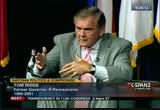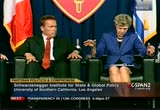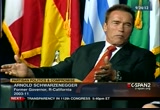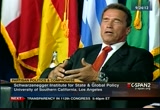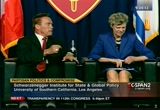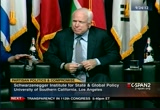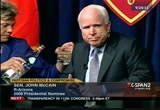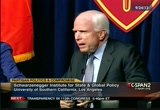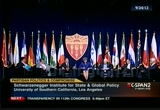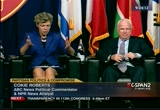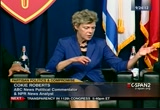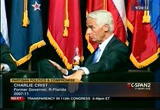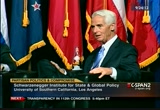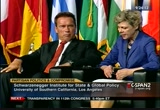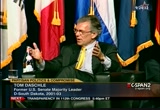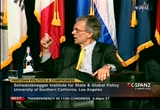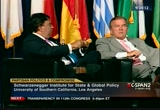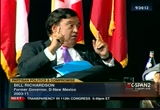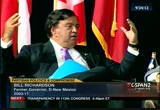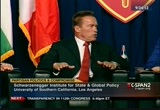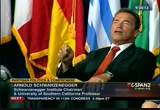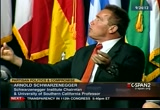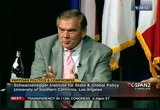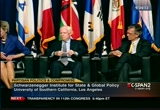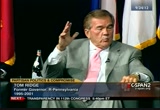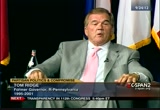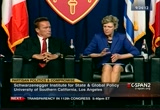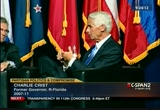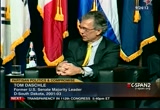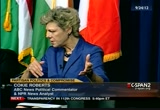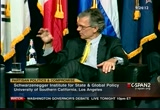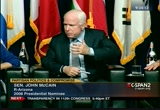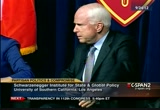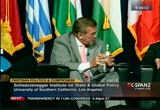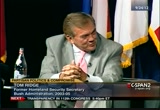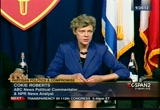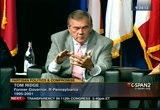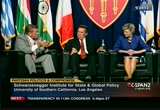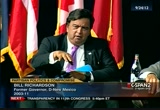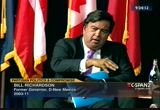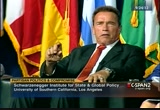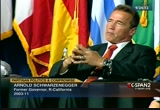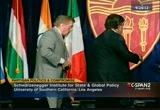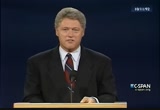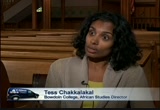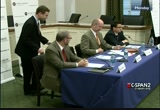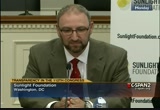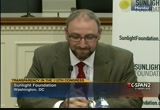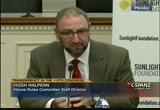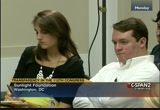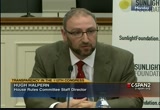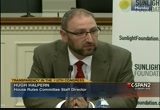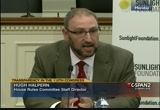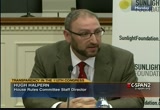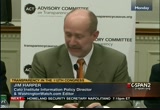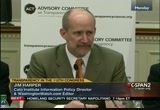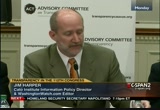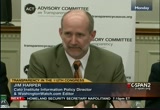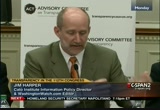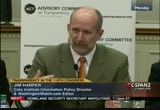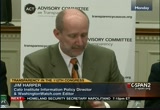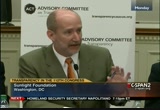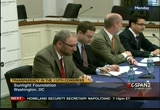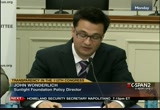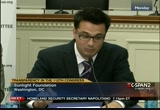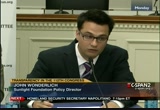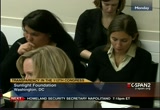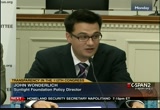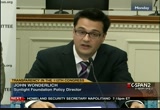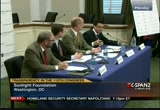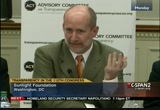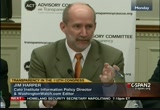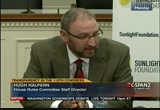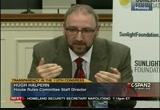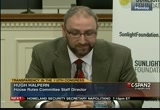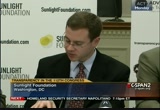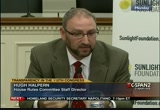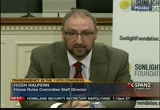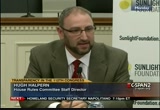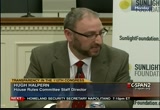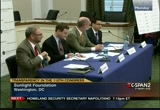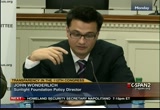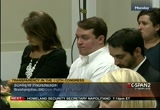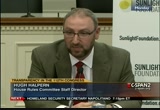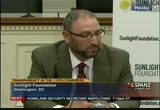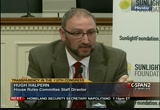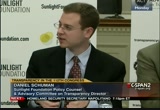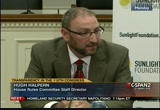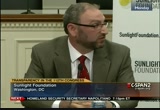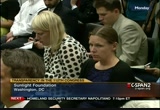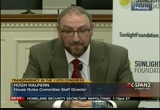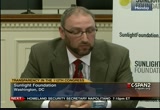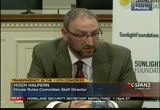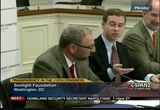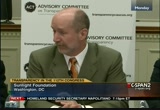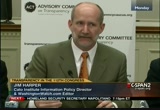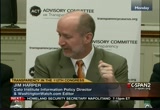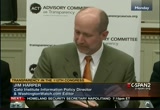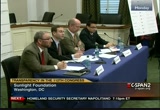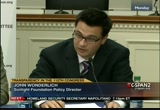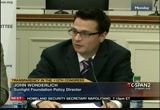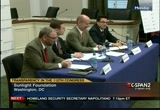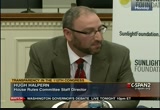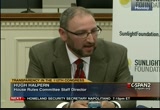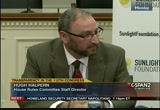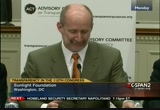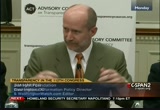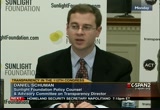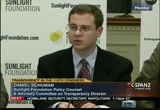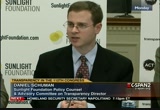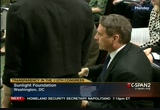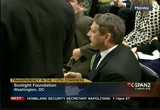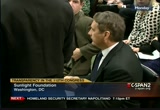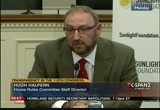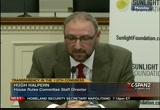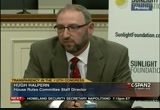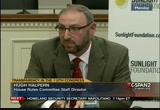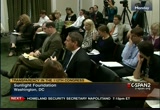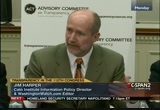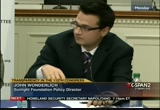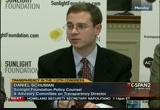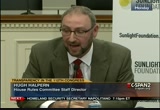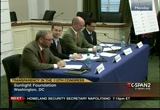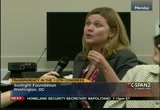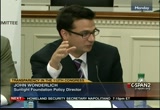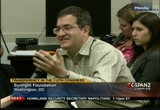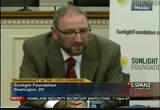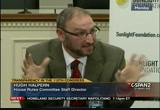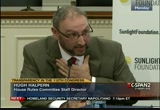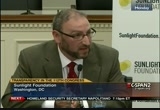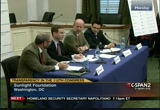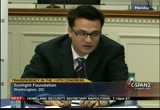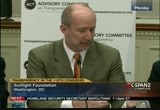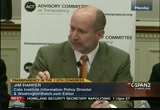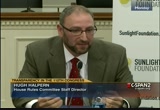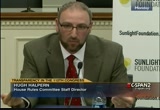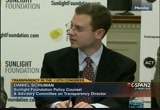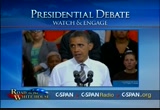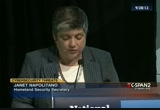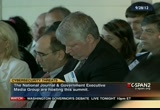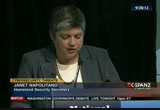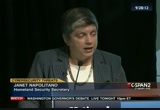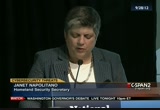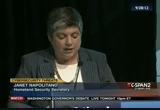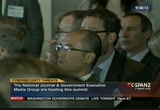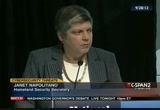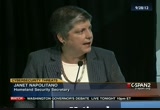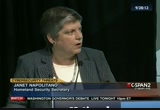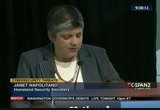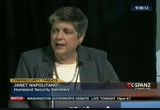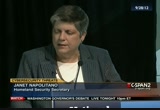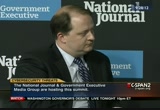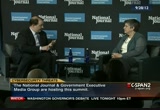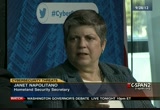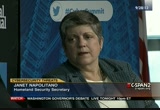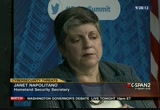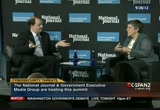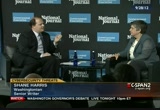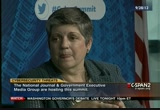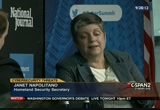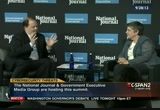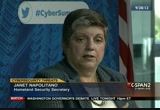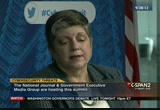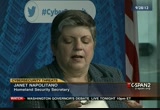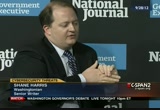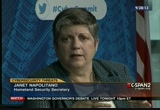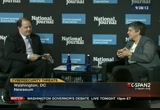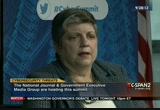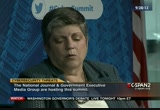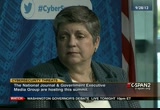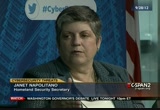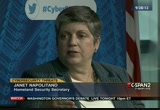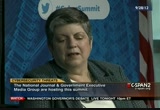tv U.S. Senate CSPAN October 2, 2012 5:00pm-8:00pm EDT
5:00 pm
independence a long time ago you had to have a decent respect for the opinions of mankind. and we have lost a decent respect that both sides should give to one another because of the end of the day to take a look at the declaration of independence or the first amendment speech, assembly, etc. there a marketplace of ideas and it's about tolerating the other person's point of view. it doesn't mean it's equivalent or you have to agree with it, it means you have to tolerate it. so the experience having been in congress for 12 years i give a few speeches and worked on the committee but i would never be responsible for articulating the vision and then finding the member of seats in the house and the senate to deliver it. at the end of the day the leadership from the men and women who have been given broad responsibility and the senate leaders and house leaders and
5:01 pm
5:02 pm
republicans identify themselves as conservative. now 62% and the numbers are reversed. you sound as governor here doing what polarization that was very difficult to get things done. >> yes, majority is democratic, but it doesn't mean they should publicans sitting up there in sacramento and the governor thought is to get things done. you have to sit down with the other side there's issues with republican friends and others can of course always a battle. every year you work with the republicans. you're not going to win a popularity contest. we really have to think about one thing, how do you serve the
5:03 pm
people the best way, no matter when it is we've got to always think about how you serve the people to not become servants to the special interests, but become those who work for the best of peoples interests. many times are so scary from like you mentioned in the speech and is not something republicans were interested in. there were some fiscal responsibility and work with the republicans and the democrats and there is some thing that somehow we got a lot of things done on infrastructure to political reforms and environmental greenhouse gas.
5:04 pm
they were still only half of the things that stood out. i never looked at the democrats as villains. remember, i was very to a democrat for 25 years. i always had the utmost respect when someone came to the democratic party. i said this is a great idea. i think this is a better idea than i had. let's put the two of you together and somehow found a compromise. i tried that in 2005, where here's my way or nothing. and felt miserably. i knew right away firsthand that approach doesn't work. the next year overwhelmingly reelect and that was inclusive
5:05 pm
and reaching across the aisle no matter what time it is, if it's a hundred years ago, i think the key thing is you have the courage to go and reach across the aisle. that's why i mentioned in my speech it's not political suicide. i think it is a perfect example of teddy kennedy and so many other people. i think the political courage has not enough stories because you always want to look for the negative. >> senator mccain, it's become more political suicide. i'm trying up the district line so everyone agrees the only way you can get is to not be pure
5:06 pm
enough, nonliberal, not conservatives. the challenges facing their last election, a challenge from the raid. it does affect how you can behave in the senate to some degree. and we have seen that with both parties. so it seems to be getting worse and harder other than people making it easier. >> let me just make two points. one is let's not forget that 2009 and 2010, the democrats had majorities in both houses of congress. they were vetoproof purity of that stimulus package, obama cared, dodd-frank, the institution of the united states are too big -- are not too big to fail. so they had two years and they had majority for two years and they ran things through with all due respect.
5:07 pm
we were never consulted about obama cared. we were never consulted about the stimulus. we were never consulted about dodd-frank. we all have to work together between 2009 and 2010. amendment 2010 elections were rejected and if we hadn't had candidates in three swing states, we probably would've been the majority in the united states senate. when i look at all the polarization to work with me for two years. the citizens united, very quickly, russ feingold and i went over before the united states supreme court. i've never seen the naïve failure to understand what the reality is that the gore campaign or about and displayed in those arguments and of course
5:08 pm
the united states supreme court by a five to for decision says its free speech. it's not interesting that money is free speech? said noticing this floodgates unleashed, spent hundreds of millions of dollars while the republican campaign is going on, vilifying that romney as unfavorables thereof. i can assure the unfavorables as the caveats went on. i think that may have also contributed a lot to this polarization going on. the hundreds of millions of dollars spent or 4 billion or 9 billion, 70% of it is on negative advertising on both sides. obviously that's going to have on the electorate. all i can ay is that there is polarization. so i won't go revise history,
5:09 pm
but i believe there will be major scandals, major scandals in the history of this country is corruption, reform, corruption, reform. there's going to be major scandals because there's too many billions of dollars marching around our political campaigns than i hope we will reform after that. [applause] >> the polarization you're talking about is also true if you just look at the numbers, when you all were in the house, to commit three, four -- >> right out the spanish-american war. >> paydirt event covering up when you got there. in 1982 there were 344 members of the house out of 435. whose voting records were between that of the most liberal republican in most conservative democrat. now there is one msi that was
5:10 pm
the same vein. there is about a third of the senate, the voting records were between the most liberal republicans in the most conservative democrats. in 2010, when the national journal members when sea route between the most liberal republicans, susan collins, olympia snowe, so two out of three of those will become and the most conservative democrat, ben nelson, also gone after this election. so this polarization has been going on long before this election and long before to fascinate, she got a nice situation. governor chris, you've been kind of railing about how you leave your party and a lot of democrats go exactly the same way. right now? what do you do? >> that's a great question.
5:11 pm
i think that for me the experience i have, i supported john mccain and his a great man and a true american hero. [inaudible] >> seriously, seriously. >> it was because of you. president obama wins the election in a month after he gets sworn in, he comes to florida to talk about the recovery act, and the stimulus. the office invited me to greet them in fort myers and i did so and introduced them. as a governor, i saw our budget into what was happening to our economy. it was on a cliff and i was very delighted frankly as a governor to have the balanced budget or go to jail that we were going to
5:12 pm
get assistance. a lot of the sort of taxpayer dollars are going to come back to florida and help us out of this thing and help our teachers, police, firefighters be able to stay on the job. but when i did that and embrace the president at that time, maybe the president of the united states. and the way my mother and father raised by three sisters and myself was that you respect others, does she do unto others, particularly, by the way, if that person happens to be the president of the united states of america. [applause] and the notion that some in my former party was so disdain not active decency. i can understand political ramifications and not think about it that way. that being nice to somebody like that and been decent in being chastised for it is exactly what we need to stop doing.
5:13 pm
governor ridge said we have to respect each other. you don't have to agree. that's okay. and senator mccain mentioned earlier with ronald reagan and tip o neill, they probably didn't agree on much of anything, yet they were able to have an affable relationship and be decent to one another and not tear each other down in the process. we have to get back to that and keep talking about this. that's why again, governor schwarzenegger, i want to thank you for getting this started. if we don't do it won't happen. >> secretary can you talk about the reaction. i come out of the goodness of my heart, recently sent to the senate press secretary in the two senators of pennsylvania, senator to me and senator casey of the two men themselves and their staffs at a softball game. they had a good time, they had a few beers, they put it on their
5:14 pm
face but page on both of them told me they got absolute vituperative remarks from their supporters. how could you possibly can so that the enemy like that? the senator from the road state, unit think that they would be a certain common interest here, but that was the reaction of the voters. they'll come you have your hand out. anyone who wants to take that, take it. >> i think what is happening right now is who got a combination of a period of 30 years really, where parties have lost so much of their power and their authority. a modest happen in the name of reform, churchill once said that the best argument against democracy is five minutes. and whether or not you agree with that, the fact is what happiness the grassroots politics have taken over the
5:15 pm
parties to have grassroots politics or the interest groups become stronger and stronger at the expense of the party and blend into that, many in media. and you've got an entirely different dynamic, where people don't understand what it really takes necessarily to try to work the legislative process to get the common ground. you've got two very distinct camps to discredit campus is somewhat a member of congress or senate or to find common ground. i think that's the ultimate in this room is filled with people like that. >> there's vast majorities of people. >> there's another group that is not majority, but i want my congressman to stand firm, not to compromise. don't give an inch. and more and more of the people bail that are coming to washington without ttitude that they can't give an inch because they are constituents, people they believe elected hold that
5:16 pm
view so strongly and that is unfolding constantly. there's one thing that brings us together and that is a crisis of magnitude like 9/11 was an anthrax attack in my office. for sure. at times when under threat. people are willing to be more accommodating, but that dissipates very quickly. [inaudible] go ahead, both of you. >> well, i know it's not fashionable to be positive and optimistic. i see some positive signs and you've outlined the causes. i think you've got to have redistrict gene, trying to protect each other, cable tv. you raise money by being negative. a short schedule -- i remember when us in the house we were encouraged to keep our families in washington.
5:17 pm
now they can't wait to leave. >> washington is on the potomac. i'm still looking for the action myself. [laughter] >> well, i just think the positive side -- as i travel coming up that i'm a price that i can travel you i see some members of congress campaigning on both sides saying i can work with the other side. i see that more and more. i think that's a good sign. secondly, i think the public is going to send a message the selection and it may be one that we can't quantify here. it's not going to be about a message. you know come you guys need to start working together or else there's going to be a third-party. i think that is going to scare a lot of incumbents. and then lastly and obviously the president supporter. i'm going to see the president
5:18 pm
considering his legacy, looking up what he needs to do and then it's going to be the republican party -- my biggest hope is that tom ridge is, the moderates somehow, just as i want to see more moderates in our party and there's fewer and fewer, the moderates -- i know the republicans don't like to be called moderate. moderate conservatives. >> democrats don't like to be called liberals. they're progressives now. >> whatever. [laughter] they emerged that the message be this extremism is just not going to work and we need coming in though, the reinvigoration of the bridges of the schwarzenegger's and senator mccain i think can play an enormously important role in this post, so i'm actually thinking that when the nation goes into christ says that we
5:19 pm
work itself out. they may not be instant, but i see the problems of climate change, the environment, immigration that everyone is saying, what is that guy smoking? i see some potential for common ground. >> they think it is just as much to do with curry each because what you're talking about is people are afraid across the party line to go on a direction and because the voters are going to be upset and therefore they may not get reelected. what looks to remain objective and you go to office to get reelected, you're vulnerable. you cannot make a move anymore. i mean, we talk about the courage, you talk about senator mccain who was in vietnam and
5:20 pm
he was going through unbelievable torture. he risked his life going over there. every time coming in now, one of our brave men and women before iraq or afghanistan, they risk their life. they could risk their life for our country. why would the politicians be a little their office for mac in the right decision? [applause] that's where the problem lies because the president in his speeches to other changes to do it. and that, every police officer, every firefighter, every single family again. that is to risk your life for your community and the
5:21 pm
politicians cannot risk their office? hello, what are we talking about here? they don't take him a shot. yes, great now it is going to be a congressman and do other things than you can be out of that for one term. but so what? is at least six years and then you move on to the regular job, to hopefully be a politician, a career politician. i think people should just -- that goes on to teach you at the university. the schwarzenegger institute is about the greater remission out there and kids are studying really terrific things and how to solve the problems, but it's the next step. if you now have an opinion of someone else, how do you get those two ideas together come to the solution and serve the people? how do you do that? i mean, i have been in
5:22 pm
sacramento, tell you, we're talking about banning sodas to the schools, which everyone knew is a must. you've got to get rid of the sodas because kids drink sodas out of are getting overweight and other health problems. the soda companies, they will kill us. if the greater minute what about the people and the kids? the soda companies give us a lot of money for the campaign and we cannot go there. so that's what goes on. there is no courage there. that is what we have to change. >> in this forum i thought about many of the discussions i had with my parents. my mother was a republican and my dad was a lifelong democrat. we always were a second job. one of those things i learned
5:23 pm
early on as they both had very strong views about governing and governance. and i don't early on that either side, governor schwarzenegger's has a monopoly on the best ideas. neither side has a monopoly on wisdom or so pricey and they can predict the future. so you start off with that mindset. i've been called for you as a moderate republican and i am just simply if you have a problem coming back to solve it. you don't run just to win. i mean, there's two parts to the equation. he went away many went together. as this in the last couple years we've lost the part of the equation. you run to win, run to win, run to win. what is the point of holding the office if you cat doing something with it? a couple observations that colleagues have made this is not just republicans or democrats. i suspect they ran against you.
5:24 pm
lindsey graham wasn't conservative enough, a good friend of mine told me a couple weeks ago that when i ran for governor, they thought it was too conservative to be governor of wisconsin. if the guy running for the senate and i don't think i'm conservative enough. even within the party were becoming less and less tolerant. i've always thought tolerance and stability was part of our -- supposed to be part of our dna. our political dna. i think the operative word here is courage. give me a classic example. my colleague and i, jack hiler, indiana, 1994 and ran for governor because the controversial issue in the foyer and we have a republican caucus. i remember jack standing nothing saying i don't remember what the issue was, but he stood up and
5:25 pm
he said, this is the boat that we should all cast. it may cost me my election, but i think it's the right thing to do. he castaic, he lost. i'm not saying that is the reason he didn't succeed in his reelect, but it was the statement of courage i'm talking about. for my you is the right thing to do, take it or the day. a quick anecdote, attorney for governor before the primary i had 100% voting record with the nra. 100%. vietnam vet, the idea that someone could walk into a gun store and purchase an ak-47 did not appeal to me. i voted against it. i voted for the bill and our member ever on this document said you could lose the election. you could lose the primary. if at least i would know why.
5:26 pm
[applause] is not so much about me, but it's like arnold said, the operative word is courage and those responsibilities of leadership have some responsibility in the media in this play as well. there's a lot of factors involved in us. >> i agree. we give our microphones to shrillest voices. what's the argument, all of that. and not all manufacturer, but the blogosphere is even worse than what the organized media does and a lot of the effort to produce nice and nastiness of anonymity is really there. gavin r. train to come you had your hand up. >> i wanted to follow up on domestic talent but i think the
5:27 pm
hope that you will for the future in this debate would talk about stability versus the lack of it really comes down to the people. you know, we travel around the country, all of us a fair amount good one thing i hear from people all the time and you see it in the polling. i mean, congress is not at the low that it accident. it is because of the fact that they will not work together that frustrates the people that are supposed to be working for. when enough of them get frustrated enough, you know, you may see of result the ballot box at the election this november that will make that case and wake up people that have been overly partisan and say geewhiz, maybe the good people in america really do want us to do things positive and protect his and help each other and maybe they have said enough is enough and were not going to tolerate it anymore. and i feel that out there.
5:28 pm
when i talked to regular people, the boss in a democracy and i think the time is coming. >> i don't know, tell it to dick lugar. >> when i got elected the first time in 1978 -- that was the primary. that's different. >> hardening. >> i got elected in south dakota and 78 by 14 votes, which is 16%. [laughter] but one of the very first things that i had the opportunity to do is sit down with claude pepper, who it then in the senate and was really an icon. he served in the house. he was chairman of the rules committee of the house and i'd always admired him so much. i asked them on the floor one day if i and just talk to them for a minute. i was so impressed by him. he said you got elected on the
5:29 pm
basis of whether you were an hour or ed, which are place in history and the impact you have will be determined by whether you are a c. or d. and by that he met the construct of our destructive in the process. when a lot more seasoned kyrgyz. i really thought that was such good advice. i like arnold -- [laughter] i was a courageous constructors are probably what we need the most. >> but you know, senator, you've had the unpleasant experience and i do think there's something to be said. courage is wonderful and all of that, but you are in congress. you think you're doing the right thing for the people. that is your aim. that is your mission. the person running against you you think is a totally who was going to do the wrong thing for the people. so it is not necessarily a lack of courage to try to get
5:30 pm
reelected under the circumstances. you think that sure continuance in office is going to be better for the voters and the other guys coming into office. so that does mean you have to trim it down sometimes, does not quite >> i think it does, but what i think a lot of us are alluding to is the tremendous courage it takes to stand up to the special-interest groups often times. whether it is the nra workgroups to the right or left, you have to deal to do that knowing they are going to come after you. they're going to be spending a lot of money and doing everything they can to malign your record and to make sure people understand that she voted against their particular priority. and that plays out over and over and over again. when you add money and media to the powerful combination, it does take courage to stand up day-to-day or stand up to a lot of these groups.
5:31 pm
>> public employee unions are grover norquist. >> exactly. >> how much do you see that as you legislate and how much worse is that than it used to be quite >> i do want to make a point that we shouldn't forget here and that is the will of the people is what it's all about. and if the people in your state or a congressional district of agree with you, but if you are not into him or expectations for you, they are not going to reelect an office. so let's not forget that part of the equation either while we talk about the special interest groups, the majority of the people vote one way or the other, not whether they are too heavily influenced by certain groups, et cetera and this brings me back to the money thing. but two things, what we see in america is traumatic increase in
5:32 pm
voter registration pages 30 some%. in many states is even a majority are close to it. that is expression of the people that they are not happy with either party. both parties if they have to adjust to that were soon or later you were going to see an independent party with a candidate that has appeal. we saw that with ross perot. i know that mike bloomberg examined that possibility very, very carefully and decided that this was not a time for dealing. it's going to take someone's with a lot of money because it's so hard to get your name on the ballot. the other point i want to make is the answer to our fiscal cliff, one of the reasons we are having this discussion is out there. it is called simpson/bowles. the simpson/bowles commission came up with what is a clear blueprint of how we can get this country back on track again. so it is not as if we've got to invent something worth that to come up with another commission. it is they are and now we will
5:33 pm
find out either in the lame-duck session or beginning in january whether the congress of the united states and the president will address this issue, or we will face consequences in the view of anyone i talk to are catastrophic and which make me believe we will probably adopt mostly or in its entirety the simpson/bowles commission, which requires sacrifice of all parties. [applause] >> i don't mean to interrupt, but i think john is onto something. i think obviously if president obama would have embraced simpson/bowles regardless of the outcome, regardless of the outcome, i don't think the race would be as close as it is today. he was given a bipartisan solution to a problem with
5:34 pm
people on both sides of the aisle say access and that you had ours and d's. the easiest way to vote in washington d.c. is no. you can find a way to vote against anything. they think he missed an opportunity and it's not a political commercial payback comes back to the politics and leadership in the courage and leadership. who knows why he didn't do it, but he had the opportunity to be a leader and he didn't. i want to talk about the programs he advocated. he advocated because he believed in. a quick comment i want to make was about claude pepper. we are one of the few -- bill richardson got elected in 82 and i think there were two dozen of us, john and claude pepper had done a marvelous job campaigning on the issue. >> when the software is second. claude pepper was a member from
5:35 pm
florida. he was a champion of the elderly and he had been in the senate and when he first ran to the senate in 1830, his opponent accused him of being a thespian and i was interpreted all kinds of ways. [laughter] >> so things have been brought for a very long time. i think at least they are not shooting each other, which they were for a lot of our history. but then pepper brand -- served in the senate and then came to the house is a very elderly man and he became the champion of the elderly. he got to the legislation that ended discrimination on the basis of age and because he was considered such a stalwart for the elderly, social security
5:36 pm
reform was able to pass because he endorsed it and they thought that nothing he would say with the bad. >> the republicans lived in fear. >> now he was just possible for a dramatic takeover. very few republicans got to let good, but i asked him to do a tv show. i remember, i got elected in 1982. >> which was the year when 26 republicans lost their seats, so this was remarkable. >> i won by 729 votes. and i asked him if he would do a tv program with me. i was most vulnerable, clearly the most vulnerable. he laid out a reform he thought was necessary in the kinds of things he wanted to do.
5:37 pm
he would've thought i'd been the architect of the compromise. that is how gracious and decent and honorable he was to a young member of congress. we did know from adam but it was that certain element of collegiality. is there to no useful purpose to come on a television program to do anything negative, even though he knew the campaign committee was coming at him, which they did. at the end of the day come you think of those who say to yourself, or different day because that generation of publication is different? is that the younger generation. not the world were two groups that many thought through the depression, went over to korea, sacrificed and pulled together. it's kind of like on the steps of capitol on the night of september 11 and god bless america unified, will fight for freedom and the resilient. we're going to be respectful or
5:38 pm
going to mourn the loss. and then what happened after 9/11? i often wonder if it's also not a generational close cultural combination and political consultants make a living bashing people with false or misleading commercials when they get away with it. >> i think the key short-term immediate long-term rise in three, i won't say voting blocs. i have no data to support this. [laughter] minorities and independent voters. i know they are key in this race. now, how do you get to them? as i woke up this morning, rather difficult because they came in from the east coast, i read that the iphone, the sale
5:39 pm
of the iphone five was going to put a jolt into the economy. it was 5 billion bucks. in other words, it's going to affect the economy. i think whoever figures out social media and technology, new ways of communicating with voters, linking policy because i think the way we have all communicated with each other and election neared, tv ads, cable, you know, with all due respect this week, when you were there, i wish you'd come back, i think it is a thing of the past. so whoever is able in these three voting blocs, whoever is able to figure out either party, democrats, republicans, third-party, how to link information flow, education and
5:40 pm
issues, expanding voter turnout is still a problem it will have only 57% of the eligible voters voting is going to control the american body of politics. and i see that as a healthy thing. so i have posed a problem without an answer, but at least i will say i think i am optimistic that this new technology is going to bring more information in those three groups that i think are the ones that will determine where this country goes. >> governor schwarzenegger commend this is your institute, so you have the last word. >> i think one of the things we should also talk about is the importance of recognizing the power of subnational government, regional government, local government because so many times i think that cities and states,
5:41 pm
provinces around the world are waiting always for some action on a national level. for instance, about mental issues. the fact of the matter is the local government can actually do about we had a disagreement with washington in the bush administration, but we moved forward. we didn't wait for anybody. they made commitments for 25% and 85% came up with three renewal and the list goes on. all those things we did and actually so much so
5:42 pm
secretary-general ban keynote spoke at the opening session of the u.n. to encourage all the other countries to go in the same direction and if the national government, the subnational government would have the power and create an organization to encourage subnational government to go in the direction and not to wait for the national government. severe environmental issues are so many other issues you can address any subnational level. you are to teach that and make people aware of states and cities and counties. i think it is a macro program. i want to thank y'all so much for coming in. [applause] those of you -- those of you who are registered for lunch, we
5:43 pm
look forward to seeing you there. i'm going to finish the saint augustine who said that on both sides lay aside all arrogance. let us not on either side claimed that we have party discover the truth. it is something known to neither of us. then only tranquilly if there's no bald presumptions that of astarte discovered and possess. that is not even the formula for civil discourse. thank you are very, very much. [applause] [inaudible conversations]respto
5:45 pm
i've got to respond directly to mr. bush. you question my patriotism. you then brought some right wing and to the house in 1969, 1970 with over 50,000 of the america state. i honor the uniform and every man woman who ever served,ing i quitting out how crowded it was stewart sherman of the joint but, when joe mccarthy went chiefsunattacking people's patriotism, he was wrong. he was wrong. the sen tore from connecticut stood up to him. you were wrong to attack my patriotism. i was opposed to the war and i love my country. we need a country to bring this country @o >> president bush, 2 minutes. >> i didn't question the man's patriotism. i questioned the man's judgment and character.
5:46 pm
5:47 pm
church in augusta, maine. it is significant that in many ways the stories begin here. it is here in this pew, pew number 23 that area beecher stowe, by her account sat the vision of uncle tom. now, uncle tom's, as you probably know, is the title character come to the hero of three to 52 novel, "uncle tom's cabin." "uncle tom's cabin" is a perfect novel, which mandated in 1860 that anyone in the north, including new england, where all the abolitionists lived, if anyone in the northwest to aid or abet a fugitive slave, they themselves would be imprisoned or fined for breaking the law. it was seen as a compromise from the north to avoid war. so that was part of what the novel was trying to do, was to
5:48 pm
say listen, i am a person, harriet beecher stowe, as was most of new england. i am a slave to find spammers herself and her border. we have a right to do that. we are not delayed. >> house has done better than the senate or the obama administration making its proceedings more transparent to the public online. that is according to participants of a semi-foundation for an in washington d.c.
5:49 pm
the group also discussed the fact that lawmakers not only read the legislation of full before voting on it. this is 90 minutes. >> welcome. my name is daniel schuman, director of the advising committee and transparency. today's discussion is going to focus on whether congress is serious about transparency. we are going to beat the one 112 congress and also identify some of the deficits. we are going to do my speaking portion very quickly because it's really interesting is of course a panelist on to say. to mr. for introducing them. on my right is hugh halpern, staff director for the u.s. house of representatives committee and rules. on the committee is served us chief advisor. immediately to my left is jim harper, director of policy studies at the cato institute and also the founder of washington watch.com, which keeps a close eye on legislation
5:50 pm
and federal funding. jenna sasser to mention washington watch.com at least several times during the course of this presentation. last but not least is john wonderlich, policy director at all about transparency guide. that is his official title. more information about today's panel under chairs and also at transparency cockiest.org. i would like to thank representative issa andrew gray, cochairs of the congressional congress for giving us the space to have >> thanks, daniel. thanks to you and the advisory committee and the sunlight foundation for having me this afternoon. i would like to talk with you about where we've been over the last two years and maybe a little bit about where we are
5:51 pm
headed in the relatively near future. you know, about this time, two years ago, our political folks were starting to make noise, but there was certainly possible if not likely the republicans were going to obtain a majority in the house again and we were sort of very quietly trying to identify issues that would come up during the transition. as many of you now, among republicans, one of the big issues is this read the bill issue. having taxed available, making sure members have the opportunity to see what it was they were voting on and i think in large part because i've be issues surrounding that and the
5:52 pm
drive to make the material available, the 112 congress really sort of march probably the biggest change in terms of transparency since the mid-90s and speaker gingrich really push the library to make comments and all that information available to the public. as we started plastering the transition last time around and going forward through this congress, i think the speaker, the reader can cantor and the republican congress as a whole has tried to clean on transparency issues and made them a priority. this not manifested in a number of different ways during our rules package, most notably was the rules change, which set for the first time in the history of the republic that paper document
5:53 pm
and electronic brake weblog. if something was available electronically, it was as good as if it had been printed by the government printing office, stuck in a truck, delivered here and distributed to offices. there are other things we did, mandatory webcasting, try to really push committees to do that, maximum extent practical. we also as part of the effort to make it tronic taxed available and measure around the first to comply with the three day rule. we created house.gov, centralized portal in the coming week. so far, for all of this year, that has been online for stuff coming to the floor, for a lot
5:54 pm
of good work from our colleagues over at the clerk's office. i would expect that what come online for committees early next year, but that works on going. now, i think looking at the next congress, i don't see the need for a whole lot of rules changes on this front. obviously we are willing to entertain suggestions, but i think we are still in the process of frankly implementing those changes are made last time around inserted evaluating their impact on what we are doing here on the day-to-day business. and i think individual companies are trying to work really hard to make themselves more transparent. i know we have the rules committee and these panel discussions i did, i was trying
5:55 pm
to type in the website and because of the issues that generally arise a little bit late, but hopefully this mud we will be launching a new rule at house.gov, centered on trying to make it easier for everyone to find what it is they are looking to research. we are putting more online format, talking about a little bit earlier i rules committee resolutions, the rules that provide for consideration of legislation. right now we are producing on a daily basis most of that stuff online and making it available but hope to soon be in a position to do the same kind of thing with committee reports, which contains the amendments.
5:56 pm
i'm sure it is going to come out. there is a lot of interest in sort of the bulk data download, trying to get information out of data system that you love and the public can manipulate and view up on the can as well. that is an issue that may not be quite as simple that it appears on first blush, but i think the leadership here in the house and our colleagues in the clerk's office and other legislative branch agencies are focused on trying to make that happen to the maximum extent we can. you know, there are always things we can do better. we are always open to suggestions and constructive criticism, but i think if you look back at our record of the
5:57 pm
112 congress in terms of openness and transparency, it is something we can be very proud of. >> thank you very much. i guess the rules of how stuck up in washington.com. >> thank you, daniel for mentioning wash and then watch.com. he was referring to the missing years ago by repeated it many times over in case you were curious because they see some of the things bloggers are constantly constantly scraping and driving for mentions of their site, so same washington watch.com didn't seem to hurt very much. i appreciate daniel's work in the work of the sunlight foundation in his perspective on games. i was interested at the mention of the read the bill movement because they read the bill does
5:58 pm
not mean people would really want, although they may think they want members of congress for a fuller understanding, certainly in congress but also across the land about what is going on, so does a nice touchstone of a broader push that all these efforts are a part of. i think when i look at the history of this issue, it goes back to the election of president obama in the real energy he brought on the campaign trail in 2083 question of transparency in the good government we all envision. from my hit by 2010, that energy had dissipated. a lot of efforts had gone towards a lot of things and we were seen the dramatic transformation that a lot of us can visualize and imagine knowing that the power of data is, but it wasn't happening very much. and that caused me to do some work and i will describe here
5:59 pm
that results in some greeting. grading is a cool cruel art. what i did is look at the problem of lacking transparency. it looked to me like maybe the transparency community had communicated well enough what it was we wanted. a lot of efforts have gone out there that didn't have direction or designation. so i sat down to some technical people. i am a lawyer, so i have to go back and learned about how these computers work, talking to each other on the internet in things like that. i sat down with them data people to interpret and language that policymakers could understand what it was the data people need and in a paper that most of you have on your chairs, publication practices for transparent government summary says. they are summarized to says that
6:00 pm
put the public in a position to make the government transparent. it's not automatic, but these data practices can enable the community to use the information that the government they publish. the practices very briefly are authoritative sourcing, where everyone knows where to find it. availability. that means permanence, completeness, incremental availability. machine discoverability that is located on the internet in a way that machines can come find it, the quintessential example would be search engines finders. ..
6:01 pm
publication and data is nice and all. the question is really whether progress is the road. that is what the grading is for. i have benefited greatly from a number of groups, the foundation being one they have all participated. helping me figure out how we're doing as far as that. the grades are the grades i am getting. anything you like about the my fault. at the quality organizations
6:02 pm
that have helped me. the grades are not geared up, but the good news from congress, i suppose, is that the administration's crates are even worse. i will go through some highlights and low lights, emphasizing the countryside because that is aware talking about. there is a hero somewhere in the person who created a thing called by a guide, which is a deep historical record of all federal representatives, including -- and this is the key thing -- a distinct identifier for all of them. by a guide makes its way out there. you see the use of this identifier of congressional websites and all of the place. the one flaw around it is the fact that we get it into mediated through websites rather than just as a direct publication. when we look for house and senate members we can figure it out.
6:03 pm
the web sites that its meat the information are -- we can reverse engineered the data about who the members of congress are. the senate actually does have a member list. the senate -- i'm looking at my own notes on differences, highlights and low lights. the house as far as meetings with house, senate, and committees, they -- the two sides have interesting works, each of them. really full -- real forward progress which is important which made information on floor debates very accessible. for example, now automatically tweets what bills are coming to the floor in the next week. because of that stream that is available. the senate does a better job on publishing and affirmation about committee meetings. so that is why they both get a b. i would like to see some house verses and a competition for who can do better, who can match the other and improved.
6:04 pm
lc1 more thing. what was interesting to me was that in the grading this time which goes back after about a year, we have returned to the grading with the grace the you see here. the grade for bills has dropped. i believe it was an a minus. probably the reason for that is because our expectations have risen. bills are very important. published kind of well. there is an excess multiplication. but there is more semantic of correction that could be published in bills to make it automatically discoverable, what u.s. code sections are affected through legislation, what locations are affected by legislation, what agencies, bureaus, except representative. i think -- so, the grades are there. i would go through them all. you'll get back to them, but it is important to emphasize that these grades are a lagging indicator. the new existence and the projects that you talk about means that there will be more data and the transparency
6:05 pm
community has to learn how to use it before it will show up in the great. so given the time constraints i won't go into the administration's data publication except to say that there is still no machine readable federal government organization chart which is fascinating and scary. the simple structure of the government is not available in ways that computers can use. >> thank you very much, and we will get back to the grades and recommendations that you have. just for a moment i would like to move to the stand-up philosopher. make sure you have the green light on. follow that introduction. >> have tried. so it is great to be with you for low bit deceptive and talk through some of these issues that questions around the way congress functions and specifically the house transparency has been, the foundation since our initial founding, deeply involved.
6:06 pm
one of my favorite transparency topics, but things are more familiar with be going through and figuring out what kind of rules changes want to see in the next congress. we are about to be approaching the senate which disastrously complicated it more difficult to change. it feels a little bit more subtle receptive. that is the question i will come back to. but when i look at congressional transparency i feel like there are a lot of different ways to reverse that question. a really broad topic, and there are different ways to look at it, so i will just proposed three broad headings under which i think at least all work content. the first one is access to the official work of congress, and that word, official, is the key word in this setting. we have seen a lot of progress and different kinds of developments during this congress and, indeed, in the last five or so years. so both data, where we don't have downloadable access to all the official workers congress,
6:07 pm
as you and jim were both saying, there has been a lot of significant progress on the front. toward the ultimate goal we have probably most notably the commitment of leaders in the speaker and house minority to release both data for all the legislative information. that is fantastic and might take awhile, but the house is really important to. on a related note i would say they have really been underappreciated in how much it offers. if you go and look at the active bills on the floor it says for its bill -- first of all, it gives you different formats so that you can download it or get the extra amenities you are a developer and want to build a website that gives people access on top of that it shows you the time of day to the minute that the bill was posted which is really extraordinary that it says sometimes it's one to 3:00 a.m. the rules committee has the same schedules. kelly function, but they give
6:08 pm
you to the minute the time the bill was posted which is just a demonstration of good faith that they are saying, we are here for you to judge us and for you to know exactly how long the bills online. and that, in part, was a response to political pressure and trying to come up with a better way for things to work, like you said, to recognize electronic documents can function as the official version in the house rules. it was not everything that we wanted. for a long time the rallying cry was 72 hours for all bills and in effect the current bill was three legislative days with an in-depth being a lot less than 72 hours. but we will take what we can get, and this is actually a real significant difference to say in the rules the final version of the bill has to be on line for three days. that is a huge improvement. largely the way that works. bringing in all kinds of other information like amendments and the meeting that led to it, the special rule under which will come to the floor in all this information is presented in a
6:09 pm
human-friendly white. that is worth perris. there have been some issues with that. sometimes the rules have been waived. the in prd funding bill comes to mind as one that was considered very quickly. compared to past congresses it is an enormous improvement. so that is one topic, access to the official work of congress. nextel lost a lot of time on it because it's more difficult, but the questions of ethics and influence, basically the unofficial things that are dictating a lot of what's going on. frankly a bit of a mess of the moment because campaign finance. regardless of your feelings about how campaign finance should be regulated, the current state of affairs is that the law is completely unclear and no one knows that the current court decisions will stand or did knock down. it's just in st. the wild west, and that really bodes poorly for us to be able to understand what powers actually artwork. so it is worth mentioning. on a similar topic, the stock act recently passed which will
6:10 pm
have massive information for us to sink our teeth into, especially around financial disclosures. there's a lot more the should have been included in that. the stock act as a requirement, for example, that sales of stocks over something like $10,000 by mitchell transactions have to disclose monthly. real estate is i have to be disclosed. some of $10,000 stock sales potentially corrupting the selling $7 million house can continue to be private and disclosed once a year. there are things we worry about, but that as a whole other set of permission. the third thing that i want to mention as a category for how to look at the transparency work of congress is how political power functions. the structure of the political dialogue. right now for last two years that has been a mess. that think that as a byproduct of having divided government. this is not the rules committee fault. in part it is obama's fault, but it is in ways a byproduct of what it means to have divided government. that is something we have to continue to think about as we
6:11 pm
think about how to structure how the house works and what kind of tools we should build on the outside. quickly because the time ratifications year, when i look at those different categories of congressional information, two of the things that we work really hard on working with, one is taking advantage of the political pressures that exist. we cannot create those nonprofits would love to be able to generate political pressure, but especially for things like this it is impossible. we take what we can get. for house reform, the majority having changed hands twice in the last six years are so, that means that a lot has changed recently because of the need to fill promises which puts us in a more responsive posture which is good. the other thing i want to mention, these broad norms around how things should function. and so two things, one is work like this, the transparency caucus and the house being generally receptive to the idea that outside groups and the public. these sorts of questions should be relevant.
6:12 pm
it's not about raw political power but the public interest in taking about how public dialogue should function. one other thing. working closely with the national democratic institute. latin american network for transparency, was the transparency on a declaration about how the legislature should be opened. opening parliament, a very long -- is a declaration with 40 or so points and 60 pages of notes where you can compare how different parliaments around the world face all these questions. by and large they are the same questions. bills online pier restatements of assets, download data. so we are not alone in dealing with the sets of questions. going through that whole experience really makes me very glad that we are able to have had an institution in the u.s. that is as receptive as it is where we can come together and think through these problems even if we don't agree. >> thank you. thank you start to panels for all that. i think of going to start, you
6:13 pm
know, i was going to delve into the details, but it must be -- it might be useful to take a step back and ask a question. why should anybody in this audience are out in the general public care about these things? we are talking about boat access, we're talking about sex and no. why should anyone care? how is this relevant to their lives? how is this relevant to the functioning of congress? it might be useful. >> i would be happy to. the fancy way i talk about this problem is to talk about rational the ignorance and rational inaction. as an economic matter if you're not going to be allowed to affect something, your rational to ignore it. even if it does affect you. thirty, 50 percent of all the nation's income goes away in taxes. you can affected. most people are rational lot to do anything about it.
6:14 pm
so it doesn't matter to people because they can't affect things. our broad effort overcomes that, so it does become rational to pay attention to what happens in congress. more casual way, compare the quality of information that you get in different sections of the newspaper. go to the weather page. you get charts and data and graphs that people turn to everyday. tells them something immediate about their lives. if you go to the financial pages the good data and charts and graphs that tell them about their investments in ways that are immediately accessible. you go to the sports page and it brilliantly intricate data about sports i care nothing about but evidently somebody does. nbc the quality of data available in an ordinary newspaper. then you turn to the national section of the newspaper and give republicans getting for a fight.
6:15 pm
senators also is a real go getter. that is not information people can use in the way that they can the good data that comes in other sections of the paper. if we can move the quality of data that comes out about public affairs to something like the weather page, the sports page, or the financial page will will have done something special and it will be automatic because they have the information. >> you know, the broader question of why people should care. i think it goes back to our foundation as a representative democracy. and back in ben franklin's day the tool of choice was the printing press. today those tools are cool and youtube and logs and all of these other things.
6:16 pm
and we talk about transparency. we talk about making information available. i have been doing this for more than two decades at this point. i can tell you, i've worked for almost a dozen different members in various capacities. every member's instant reaction to should we make a particular piece of information available is to say no. why would we put that out there? it could create a communications problem. we are not directly controlling how that information is used when need to put the brakes on that. you know, i think sort of the sea change that has occurred over the last couple of years, and frankly when the majority change this time around, the
6:17 pm
concerted decision was all of this information this exists someplace. and in the era of global and youtube and bloggers and everything else, the notion that you can control this, that you can just sit on it who is not realistic. better we should be putting that information out there so that individual citizens can make their own decisions. we can debate these issues on the merit as opposed to who has the better data set. i think you are at the front end of that philosophical change. he go from sort of that underpinning to the more concrete example of things that we are not getting the best grade on the we would like.
6:18 pm
you need to keep in mind that there is, you know, 230 years of history here where we have been doing things in a particular way to expect that we can and been flip the switch and suddenly change of this so that it is in the perfect format at the perfect time, a very lofty goals, but very hard for us to. i think with that i will yield back and we can continue that discussion. >> i do want to of follow-up. something that he wants to say. i can hear the gears turning from are sitting. let me get back to you. so, you know, for transparency from the public perspective you let it up very well. there is a case that is often made on behalf of transparency from internal congressional perspective as well. it is not just the constituents,
6:19 pm
but often has to do with sharing information and resources. the one community available on all. everyone gets to see the same bill at the same time. something. >> sure. these are all things that are evolving. i will use the rules committee as an example. because in groups where i talk about what the rules committee does, we have a number of different roles. we can use a number of different analogies. we are both one of the analogies i use is we are both the traffic cop for the house directing that kind of routine legislative business acting as the speakers representative to make sure that things flow the way they're supposed to. we are also sort of the s.w.a.t. team at the same time. if something bad happens we are the ones that get called to try
6:20 pm
and fix it. and as a result, our website has largely been one of the focal points for folks trying to figure out what is going on with respect to legislation. and we have several different kinds of customers. we have internal customers, individual folks and committees and a member offices who are trying to bring their boss up on the amendments that are made in order, the -- what are we looking at for the next day or next week. we have outside folks. we have interest groups and lobbyists and folks like that who are trying to advise their clients as to what is coming down the pike and what they need to deal with. and then we have a broader class is of constituents or just
6:21 pm
trying to follow an issue that is of interest to them for whatever reason. and, frankly, academics, people who are trying to figure out how the institution works. all of those folks are coming to us to try and get that data. it also does not heard that the way the majority and minority have been doing battle at the rules committee sense i was a member driver very long time ago , you know, has been statistics wars. two is more open, who is not. and, trust me, i have done battle on that front just as my democrats have, and we can all sort of work with the state debt and provide the message that we are looking for. i think the philosophical -- in the hope of getting your
6:22 pm
question, but the philosophical underpinnings both with what we have been doing, so far this congress will we hope to do with our website here when this launched is in the next couple of weeks is try to make that information more accessible to all of those audiences. good example of a small change, but i think one that will help, a couple of years ago we started just -- actually, when we were in the minority, providing a complete list of amendments that were submitted to the rules committee and some indication along with the text and some indication of how they were disposed of. we start doing that on the table it is helpful, but it is not perfect. but one of the things we are building into this iteration is the ability to manipulate the table, to the sort columns.
6:23 pm
you can instantly see what god made in order, what didn't, what gets submitted by home and those kinds of things. and hopefully in the not too distant future, you know, we will be able to provide you with a direct download of that information. and the other folks can use that as they want to. again, i think our attitude has been, we should not be playing hide the p. rather sort of put the affirmation out there and have the debate on our performance. >> so on the -- to you want to talk about the interior or the broader point? so, on the broader point about why this is important, i think almost everyone in the u.s. who is politically aware was angry in the last decade about the 72 hour rule. because they either were angry about the patriot act or the health care bill. that is, to me, where the two
6:24 pm
sets completely flipped. fahrenheit 911, michael more interviews john conyers and says, sit down. everyone was up in arms. the rallying cry against the health care bill was about reading the bill and that it was too long. all these ideas. and so what i hope is that we can be beyond some of that and that politics is always going to have some element of political procedural accusations that a back-and-forth, but i think that if you look broadly enough over time there is such a thing as progress on legislative process issues. if you go far enough back there are things that are clearly worse than we have gotten better at. and over time the goal is to elevate substance and merit and they're is a lot of tricky questions about representation of political power that are somewhat intractable but that over time we are making something that works better the
6:25 pm
results in having people feel powerless and frustrated a little bit less often, and that, to me, is what the goal should be. and then even more specifically to now i think one reason this burke is really exciting at the moment is that technology has totally changed expectations, as you said. that conversation is going to happen no matter what. people are going to talk about everything constantly. that can be based on substance of what is happening in congress or if it is something else is going to take its place commander not going to like what that's going to be. it's going to be fantasy and ridiculous out of control, partisan. whenever. there are a lot of things. to me it is a question of the starting point should be a dialogue that will be happening constantly, and we wanted to be informed with at least was actually happening. that is the very minimum bet we should aim for. >> i can just point out one little thing. trust me, my own members are just as guilty of this. there is no such thing.
6:26 pm
there never was a 72 hour rule. the rule has, since it was put in place and probably the early 1970's, the third day. so it says that if a committee report, and that is what it actually refers to, has been available, it can be called up on the third day after which it has been available. and that has always keyed up when the government printing office physically delivered offset printed copies to the house. now, things have changed markedly since then. now we are relying on electronic and, frankly, one of the reasons we recognize electronic documents is that etf that you're seeing on line is the exact same document that we would create that printer from. we would hit print and some large machine would spew out paper.
6:27 pm
so there would be identical documents. i understand that there will never beat that perfect amount of time to review something, whether it's short or long or anything like that, but my members did it, both in the timeframe leading up to the 112th congress. i no there are lots of folks on the outside to keep talking about the 72 hour rule. just felt compelled to point out that it has always been the third legislative day as opposed to that true 72 hours, which, in our excepted terms of the political promises. >> to in terms of what is in writing verses what we say in speeches, i will grant you that. but the -- i think if you look and see what we have been doing,
6:28 pm
we have actually done that if not even a little bit better. a good example is for bills where we are asking for member offices to submit amendments of the rules committee to coulter, do some three guys and then come up to the rule, you know, during the last two congresses we actually computed it, and the time between when the rules committee would make an amendment announcements and when we would actually have our meeting was sometimes a shortest today's. the averages about two and a half. we would work really, really hard to try and extend that amount of time so that we are giving folks really a full week where we can or for five days, working days where they have the opportunity to look at that. so it is one of those things
6:29 pm
were the will may say one thing. i think our practice has been where we can to try and air on the side of giving more time, rather than less. the seating for today's panel had you over here and on over here because of the electric debate. three days versus 72 hours. >> this is why some the metal. so, i want to pick up on the point that both of you have made . and i'm going to have a little fun with it. so, you know, i am hearing a lot about the successes. i'm hearing about the deficit. i think it might be useful to read birse the rules a little bit. where d.c. the greatest deficits in terms of what congress is to do to be more open and transparent? was the next big thing of the next two big things. out of fairness so that they can be -- similarly, you can identify deficits if you so
6:30 pm
desire, but if you help identify where in the last two or four years your senior the greatest positive changes. >> sure. now, i'm actually going to key off some of the stuff that -- some of the work to master over the years. you know, what we are doing well right now is providing sort of common documents and fairly common, easy to produce formats, and we are doing that better than average, better than we have in years past. what we are not doing very well is sort of providing some of this mess today that would be useful to folks like jim or you all or folks on the outside. now, and i think that this has a lot to do with the evolution of the tools that we are using.
6:31 pm
but i constantly have to remind folks that we are just slightly more than three decades away from where we produced everything with hot lead type. okay? those machines are still sitting over the government printing office. day -- there is even a movie called line of type. if you are having trouble sleeping, it might be something you want to look at. but keep in mind, on the time span, that is where we were in the early 1980's. now as of 2012 we are only probably 4-5 years into using a windows-based authoring tool. so prior to that we were using text editors and das-based self.
6:32 pm
and there are still remnants of those items that is still in the workflow today. those are things which make it very difficult for us to add a lot of the useful data that jim has been asking for for a long time. and when you pair that with sort of our own internal work habits, keep in mind, the house of representatives, i have been a house down my entire career. the house is really the easiest way to think of it is about for order and 60 individuals small businesses. you have 435 member offices, all of whom, you know, do things in their own ways. you have about 20 or so different committees. think of those as kind of medium-large law firms. again, all of us, we are of producing the same kind of document.
6:33 pm
if you were out in a private sector law firm, you still have to submit the same pleading to a judge, but we produce them in different ways. some people use words, some people use more robust tools to do that. we rely on other legislative branches to provide input cent of that. now, the problem is that there is not that cohesive architecture, and the structure of the house makes it hard to acquire that of the folks actually producing the data. we are trying. you know, i think it is folks who are leading by example, and that -- as we start to bring on line some other tools like face to, i think you're going to see efforts to try and bring committees along to try and provide that kind of meeting dated or other kinds of data that would be helpful.
6:34 pm
it is sort of right here where we are right now, that is probably one of the things that we don't do particularly well. the other thing, and this is just by nature of the institution. when things reached a critical stage, which over the last couple of years has happened more often than i think we would like, we are not great at doing things in sufficient time that we can sort of go through the regular process and whether that is we are running out of our ability to issue debt or we're coming up on the fiscal cliff, places where, you know, i think the public and other folks will rightly say, this is where transparency is most important. it is by dint of the way the process is structured and the
6:35 pm
length of time required for negotiating out very, very difficult issues, it is hard for us to live up to that. we try, but, you know, i -- the role of the rules committee is to-fold. one is to move the majority agenda and to is to do it in the fairest way possible. our responsibilities are in that order. and, you know, i think we will make every effort to try and make stuff available as far in advance as we possibly can, but at the end of the day, if we are facing something that is critical from whether it is of our own creation and not, it is our responsibility to make sure that this time. >> thank you very much for that. and i hope that may be rising from the q&a we will have with
6:36 pm
the audience and a couple of minutes, you know, there were proposals in the 90's, for example, address some of the technological coordination issues. some of which came to fruition. there is the creation of a couple of committees that exist. one point there was the idea of creating a chief technology officer for the house you would have responsibilities for coordinating policy throughout the institution. that never really happened. for whatever reason the proposal did not make a forward, although we do see that and pier institutions, the house of lords in the u.k., for example have a basically purse irresponsible for both of those chambers there. i think. and always be confused with the uk. basically from there majority, the majority and minority equivalents, so it might be interesting to sort of explore how the processes have changed, but that is my question.
6:37 pm
we will be getting to your shortly. so, jim, where has the house made progress? >> i like that question and i will answer a different one first. which is, what things are so hard that it is unfair to expect the house to really show? there are plenty. technology referred to them. the original congress. personal returning to give people generating bills armaments. an elected degrading sheet the three at the bottom, really hard
6:38 pm
work things no one really thought of before. we want to do our investigation of all the things you want to know to have good data about what congress is doing. jesse that there is a constitutional requirement each house maintain internal. the journal, if you want to talk about it hierarchy, it is just as basic care bones of what happened. we get a message from the senate. we sent a message to the senate. we sent a bill to the president. we received it. so forth. that journal is exported because of the congressional review act, but there is a thing that if you wanted to see how the congress was working, you would want the job to be represented in data. working on that. it's not a huge deficit, but if you want the whole picture he should probably have it. amendments, there are amendments said, some places visible, but they actually reveal how they affect the underlying legislation. a super complicated problem. particularly if you get second-tier amendments. how you represent i propose to
6:39 pm
change the document that proposes to change this document and usually the document itself is a proposal to change existing law. so, you know, there have been proposals floating around to the change the way bills are introduced in congress so that rather than just being amendments to existing code it says, the coach say and the changes are embedded in it. some state legislators to it that way. it's a lot simpler, but that is why amendments to celebrate. it's really a hard thing to do. so there are lots of things that give bad grades because they're hard and our grading system does not have and it's really really hard. you get a good grade anyway. no social promotion out of the cato institute. but there are plenty of good things. i talked about the bias died. some genius a few years ago created that, and its benefits are quite ready, quite apparent even though we do have to gather the data and to be aided by websites. the existence of committee at
6:40 pm
the fires, similarly its basic structural identity information through committees. to that it's on the pds stocking in the house. those in exile. even though the -- the semantic information that talked about is not there for the most part, to have bills in excess mellon the first place is a good starting point. i have a project where, cross your fingers, jesus off by saying this in front of a public audience. we're going to go into production in the next congress adding that semantic information to the house x amount. and put it out there and see if people use it. a vote information is quite good. it's done an x amount, quite excessively. the knock, you know, adding down the bad things in with a good, unanimous consent in voice votes is not there. many decisions are made through unanimous consent and voice vote as arthur roll call votes. and, so, for many purposes, it's
6:41 pm
just as important to get them. so that is important stuff. it is interesting to me, actually, that some of the most important work is kind of simple. that is by a guide. this unique identifier for every member. that simple fact can be integrated into lots of different documents. identifiers for kennedy's and subcommittees, identifiers for meetings, just identifying basic information about meetings, what organization in the house and senate is, what is happening, subject matter. you've done a lot. so there are good things happening. it is hard stuff, and i don't think anybody should be, you know, taken to the woodshed because the graves are not high quite yet. we are all learning. >> and as we are about to go to john, answer this question as well, i also want folks to be thinking that, of course, pay attention when he gives his answer but questions that you would like to ask. i know it's hard to do two things simultaneously, but we are all going to try. >> as far as -- i agree with
6:42 pm
what the speakers before me said. i think especially i agree that there are a lot of specific things online now that were not before, and i specifically call down into it again. those -- i would use a lot of work. usually answers the question that i have for even to say like these amendments that were proposed for this bill that got voted up or down. it's just pretty extraordinary. the rules committee. another thing specifically for the house is that at the beginning of the 100th of congress the speaker committed to getting video online, streaming video of the committee's. and the house has done away better than i thought it would have bet that because it is really up to the committee chairs to do it. overall they are all streaming
6:43 pm
as long as you ignore every appropriations committee. so it is kind of terrible oversight. if we rule every appropriations committee it's almost an understaffed. the results are really clear. they're all on line except for the appropriation committees. so the problem is really clear. to that is, i think, significant and then as far as the broader fill your, it is really the same thing. not necessarilyhuse fault. you talk about in some sense, but the super committee, to me, is emblematic of the biggest failure which was just how about we do away -- the assumption, if we dispense with all democratic processes accountability and begin secret, maybe then we will have bipartisanship in progress. maybe that is how we should do with all the most difficult
6:44 pm
problems rolled up together. and that is how we summarized at the time. work on a separate transparency ax and a number of allies to try to beat the thing back. it was a deeply frustrating thing. hopefully that never comes up again because i think it was terrible. on top of that i think the super committee made it clear that some of the terms defined in the house and senate rules are not defined well enough, so this is a committee was able to say that their meetings were public because when they were meeting for ten hours a day in the cdc in the visitors center, it was not a meeting because they were not voting. obviously a meeting. every journalist basically said this is crazy. one of the things that we are thinking through in the next house rules, and to knows, just as feasible. but the question of what you count as a meeting. that is not an easy thing to define, but i think one of the lessons to a super committee for us was to say, it's clearly not defined well enough if what the super committee was doing was able to pass is not the meeting.
6:45 pm
>> just to come back on that point a little bit. i am the first to tell you that the super committee, so-called super committee, well, i feel compelled to point out, it was not a house idea in the first place. but -- and i know because i was there because i have drafted. so sort of starting from the point that, hey, this was not our idea in the first place, you know, you bring up a good question as to what is and is not a meeting. i think this may be an area where some of the most ardent transparency advocates and i would probably part company, which is the notion that every single discussion of numbers or groups of members needs to be sort of out in the open.
6:46 pm
and having -- having actually done substance at one point in my career, i can tell you, there is that stage in every negotiation where each side is going to put out really, really, really bad ideas. and you know you have to do it because you have, whether your member has an interest group or constituent interest or you are carrying water for the administration, i have worked both sides of that. you have to carry water for something that you know is not a great idea. and to some extent having a situation where you can trade authors, where you can discuss issues outside of the camera is important because the five minute rule and sort of the formalities that we have for committee process don't always
6:47 pm
lend themselves to sort of having those kind of honest discussions in the honest back-and-forth that members need to have. now, that said, there is room for abuse on sort of both sides. you can gain the definition of a hearing or a meeting very, very easily. now, my prior career as committee counsel, we walk that line when we had to. but by the same token, their just needs to be some ability for members and it may be sort of a committee of the whole. it may be a situation where it is all ten members of that committee sitting down and talking. and, you know, it is not perfect from a but it is better than a lot of the alternatives.
6:48 pm
>> that -- i wanted to say something. you added more to it, what i wanted to get to. the minutia of win is a meeting a meeting actually illustrates a very sort of high-level point about transparency. the demand for transparency, the reid the bill demands, in a dimension of it, it is a demand to stop being politicians because what politics is is that dealmaking, that is required in some of the circumstances that congress finds itself in these days. so we will have these teams where everybody is in the same room, but it is not technically meeting. you would confess that sometimes the bills move too fast. the 72 hours / three day rule, whichever you prefer, is meant to kind of stop that happening because that is politicians being politicians. and president obama sunlight
6:49 pm
before signing was a parallel promise that i have been tracking since the beginning. just at 66 percent compliance with the pledge to put bills online for five days and receive them from congress before resize and. and it is roughly speaking the bills to rename post offices get five days of sunlight and the bills to spend huge sums of money towards the change around the organization of our health care system, i'm not sure if that one did not. but in generally speaking, the more important legislation moves fast, it does not get sunlight before signing because the deal has been struck and it is a very sensitive deal and if we have to wait two, three days the deal could be broken up by all of the interests who care about it. that is congress saying, we have these decisions. you don't have them, public. one of the reasons i like transparency is ideological.
6:50 pm
represents a shift in power back from congress to the people whom congress affects. >> as we are getting ready to go to questions, i'm going to take a moderate is bright dividend just add one or two very quick points. in terms of successes that i have seen, there has been a cultural shift in the house. people in both parties in different races with the institutions are having a conversation that there really did not have before. i'm not saying this on the senate side. you can tell by my panelists from several committee who are sitting to the right, how difficult it is to have this kind of conversation in the other chamber. at least with house there seems to be a number of members who are serious on both these issues and that staff are able to get together and have these kinds of conversations. i mean, the congressional
6:51 pm
transparent secaucus, the fact that we can have you here at this conversation and a public place is a sign of a cultural shift that is really fascinating to watch as well as hopeful as it happens to be, but this kind of cultural change, even in the house is not spread evenly. john was talking about the appropriations committee before. and he is right to mention that. that is where there is one of the greatest influences of money and power. and you can see subcommittee markups. 50 percent of their hearings during the time that we looked at are not available online. the issues with what they do in particular goes on and on and on, and that is really where you see some of the most important is is is being made within the house and at al's weather is, you know, an incredibly strong commitment to a major aspects of transparency, so it is really kind of interesting, but i do want add one more point. i'm sorry.
6:52 pm
witches, the major feeling that i was surprised that was not mentioned. the ability to find out what is going on the committee sufficiently in advance. the senate as a rule where everyone from all the committees are required to file notices of hearings with the senate in advance, and there published in the record. you can look. three weeks out, four weeks out oftentimes even longer. not ideal. they don't do it in action now, but at least is liable. the house does not do that in the same kind of way. it is very difficult to find out what's going on. you have to pay for congressional quarterly or these other subscriptions to try to figure out what is happening. so there are still interesting disparities between the two bodies. you know, the house in many respects, when more advanced. there are, of course, certain circumstances where the tables are reversed. so, -- >> one thing about this that that should be mentioned is senator mark warner's
6:53 pm
reintroduction of the day at, which is much more about executive branch transparency, but when you mention that -- to imply there is nothing happening in the senate which has already passed the house, over in the senate. just reintroduced it. so that is a bright light among a lot of darkness of there. >> for questions, and we will start in the front row year. bringing a microphone right around. >> hello. >> yes. i am repelled the janeiro. i helped congressman brian barrett right the read the bill resolution in january of 2006, and i want to say that a lot of progress has been made. i would praise especially the staff of the house rules committee and the sun life foundation, the technical expertise for creating, you know, the website and a lot of those things. i would like to resist, however, what i think might be amice impression that some people come away with that this is primarily a technical problem.
6:54 pm
i think it is ultimately a political problem, especially the question of availability of important bills. you know, the patriot bill and pass and that could have a provision that will block some of us up. this stuff really matters. and, you know, when ronald reagan waived the big bill and around his state of the union in the late 80's, you know, the democrats could not have a plan that that did not have microsoft word. you know, they did not have enough time or whenever. i would say, the continuing resolution last december was very fast. very big. very fast bill. and there are others. and, you know, it seems like when it really matters that is when we are least likely to get the time to read these that we really need to defend ourselves as a society. so i want to say, all the technical advances are good at creating, you know, 30, 40 different variables. the real crucial thing to me is,
6:55 pm
you know, before we pass these huge loss, especially if it is in the middle of the night, what is the political failure here that we still cannot do this? and i would also note that it is doable. the affordable care act, obamacare, there was 72 hours on the conference report. everybody in washington, i was marveling because it was sort of accepted. nobody argue with it. hamas lobbyist a couple of months ago who was complaining to me that they could not because who is going to hang out there for 72 hours and they could not get away with it. so this can be done, even on use things like the affordable care act. and, you know, i would ask, what can the rules committee do and particularly the members to actually enforce this and change the expectations of the leaders, the committee's demand everyone else. we are the traffic cop and the answer is, you're not going to go if you don't do three days. by the way, it should be 72
6:56 pm
hours because right now some time to study for a half. we are sort of complying. i put that out. >> let me respond to a couple of those items. the -- the -- with respect to the operation three day rule, i understand that some folks think that 72 hours is best. you know, the problem comes in when you are not necessarily as much on the example where you are using, but where we are three hours shy. and, you know, i think the question is, okay. are we going sent keep members 1500 cops, of the clerks folks
6:57 pm
and everybody else literally doing the funds for three hours before we can call something a. >> three hours out of 72. and that is one of the reasons we don't count hours. first of all, counting days a lot easier. in large part because, you know, again, going back to the origins of these items, we didn't get a time when the green jeep p.o. delivery truck arrived at the loading dock and the time that it took somebody to get from the loading dock in the back of this building all the way over to the house floor. we said, okay. arrived on monday. you're good to go on wednesday. now, i think the other issue is, do we -- what happens in that instance where, you know, we put something up on on friday or of
6:58 pm
intervening holidayers something like that. how did you -- how do you account for that? that is one issue. and why it becomes very, very hard for us to count hours. from a logistical standpoint on the floor. you know, the second issue is a political one. you know, when the clock stops being the leverage point i think you will see it. it is a lot easier for us to up put that three days in their with absolutely no exceptions. but unfortunately that clock in a lot of these instances is the leverage point. so even if we are three, four, five days out and the decisions get made. okay. this is what goes in. this is what doesn't.
6:59 pm
this is the deal. the execution time to go from that to something that we can post online hopefully can happen within that timeframe, but not always. and, you know, i think that the balancing act that goes on there is, what is the consequence? and you know, if that means the u.s. is going to default on its debt, i feel reasonably certain that the will make the decision to waive this. keep in mind, the only way that this gets wave is if 218 members vote for greuel from the rules committee. that is the only way that happens. so we are a majoritarian institutions, and as long as you can get a majority is something in you can do it. i think we have been trying to
7:00 pm
enforce new norms, trying to enforce greater availability of things. and you're absolutely right. like us said earlier, where we had situations where we are running against the clock and there are potentially dire consequences for not meeting that clock, that's going to make it a little bit harder for us to of meat that. that does not mean we're not going to try. it makes it harder for us to do that. >> over the technical progress. you have to recognize this is political philly a. we are still passing massive bills spending trillions of dollars. people can be locked up in the middle of the night for no reason. no habeas corpus, whenever. people are not getting due consideration. ..
7:01 pm
and congress will naturally brookline itself to follow regular order is the public receives it. as much as argumentative rules to act in a way that is transparent, the public -- the transparency committee needs to understand how the process is supposed to work in a big red flag when the process is that going that way and this has got
7:02 pm
to start. the demand has to come from both sides. >> i agree. ultimately that is when i can rely on. they're incredibly porton and put a lot of effort into it, but the majority can change at any time in a thing that keeps arose from changing constantly as public expectations and norms about what is appropriate. that is why we didn't go crazy. i keep putting up a blog post that says 72 hours. it is a big shift that says we're going to hold ourselves to that and even if it's accepted sometimes, the one reliable thing here is the norms for the democracy of how things should function. even the best was favorable. i will choose clear expectations is a clear rule. >> i think it is worth adding to that the concern i often have is to the members know what they are voting to wave? this is where there's a will in
7:03 pm
the house -- ran sayer, which basically shows how the proposal would actually change the law. their technological reasons why the council is having difficult to showing that. there are other issues as well. the concern i have a thing be shared by the concern you have a slow, which as you can get 218 people to go for anything given the right circumstances and most of the time you can't get two people to vote for anything. the one thing they can go for is to basically go further ignorance that we don't know what's inside and that is the politics concerned that has to do with the overarching nature of our polity.
7:04 pm
>> when they just come back on two items they are. one is this concern that we are constantly waving things. just so everybody knows, every rule, republican, democrat for the last several decades contains a general waiver of all points over. we call that a prophylactic waiver so it is fair to project the chair from having to deal with and dispose points of order. one of the things we started in the past and have relieved tried to build into our process at the rules committee this congress has been a detailed explanation of any believer that is actually covered by that. you can pick up the report for any rule and it will say all of these wafers are purely back or we say we are weaving this will
7:05 pm
come of this rule the school and here is why. because we didn't get x, y or z and times because one of the most common is we have to fix a cut go problem. so you know, in order for us to get the amendment up we actually have to waive the rule. again, we classify that more in the technical category, but where we have waited for three to rule, we've been very up front about saying this is what we did in having folks judge us on that. i can go back and check. i don't think we have spent many wafers and this congress, but you know, it is something we definitely prefer to have from committees. i think the alleged counsel, provision council, other folks
7:06 pm
involved in the project to produce more about comparative information and try to make that available to us. committee members and other consumers who would benefit from having that. >> angela. >> i come i'm in the project on oversight and another good example of one of the better, more open processes we've had was the dog for a conference, where we were able to see all of the formal meetings and negotiations around the table and that is a rarity today. i also have to mention that the senate is so far behind the house in terms of all kinds of disclosure. some committees you can even get the rules for those committee, even if you harass the office. not only is it not online, but they just don't make it public and that is unforgivable in my
7:07 pm
eyes. some of us try to make the senate armed services committee more open and how it reviews and authorization bill for the pentagon spending, for example. billions are authorized, but there's no transparency in the process. i also want to give my good friend and colleague to clarify the statement he made about nonprofits and their ability to pressure. >> my point is that it is really difficult. we do what we can to be relevant to what is politically as in we all play in that role. but compared to the minority switching hands in the pressure i played there, but very difficult for nonprofit to just create, so we can't create political circumstances, but we do things complementary to what they are. does that clarify which are not? >> difficult but not impossible.
7:08 pm
>> jim snyder. my question is to see you concerns the transparency congressionally sponsored event. i've been involved with about a half-dozen of them. they are incredibly valuable for nonprofits. not only are they free, that they are high prestige in great trade press doesn't apply to this particular audience, but in general to the media. >> how dare you insult my audience. [inaudible] -- you look at foundation proposals, if you know, there follows references to hillebrand's. so it is incredibly valuable perk and it does change behavior. the question is like lobbyists
7:09 pm
exposure and whatnot to the tune of hundreds of billions of dollars a year. should the database for a half-dozen years, should the database of congressional sponsors and nonprofits that receive them, should that be public? the hole affects stock of routine. i've never seen an article on it. it gives you a lot of insight. i'm not at any way suggesting that this effect yet, but is an important resource and should be disclosed. >> i think this fits in with the theme we have been discussing all london's afternoon, which is that sometimes it is hard or too focused on issues that are not quite as high-profile.
7:10 pm
you know, the other ratio is one of resources. you know, i think you folks are sitting down and identifying the whole series of issues and problems, to be honest, this is the first time and never hearing of the concept as opposed to having a 20 minute long 60 minute speech on insider trading by members of congress and their staffs. so given those two items and limited resources of the powers that produce, maintain and otherwise make that data available.
7:11 pm
[inaudible] the sort of given those two items, i think, you know, the emphasis is going to be on the bigger fire that we need to put out. as recently as last week coming in now, we were dealing with the continuing stock act problems. and this next statement is purely transcendent, not my members, but just to play not give a whole of individuals in the executive branch you do not think their information should be out there. and as i was saying to the other members of the panel, the same information about george truly has been available online, whether i like it or not, for the past several years. so you can go online and see exactly how lousy my investment strategy is.
7:12 pm
but you know, there aren't number of people, some who have a perfectly legitimate reason for not disclosing that, but my personal opinion is there are those probably trying to cast a much wider net to capture people people -- to try and keep more of that information offline and probably should be. so you know, i think we'll always be willing to take a look at other items, but sort of again, we've got a very small group of people who do this work for the house. and the house as a whole has taken another% cut over the last several years. we've got dwindling resources and we need to leverage those were sort of to get the biggest
7:13 pm
bang for the buck. >> job, do you have something? >> would describe as there's all these implementation issues characterized that the concerns are 50% valid about disclosing the assets of your spouse and 50% scaremongering against members who don't want to slow things that are disclosed. i don't think you have to sort out which claims are valid, there's a lot of people who specialize that should be able to work it out. all of these people come out of the woodwork after it passed. >> i love the whole committee act event at the white house when we talk about executive branch truth. the, i surely would have a number of issues. so as we are beginning to wrap
7:14 pm
up, i would like to ask the panelists, you know, we've spoken a lot about what has happened in the past, some of the deficits we have seen as well. so i'm just going to rest briefly and we will start with john and work back, which you say should be the next step or two that congress should take? >> so we are ready for raw data. all these third party sites are thriving can have reliable media and usable information that empowers people to analyze and reduce congressional information. so that is something we've been working on a long time. all the public stuff of congress required to public should be online and obviously it demonstrates they are with obviously appropriations committee sketch up a little bit and documents important and valuable to have online and that is the third category i would
7:15 pm
say his influence and ethics disclosure that is proportional to america's role in the world. we should be leading but that means that right now we did for a long time. it is politically difficult to deal with. so the stock act, rather than the scree division practice? is more likely to pass in the right now. i'm sure a lot of work went into it, but ethics shouldn't be legislated on as a result and that is what we saw appeared so they can see that the better developed. >> i think the most important thing going forward would probably be passage of the data act or implementation of what the data act has done it without legislation. doesn't matter which. the reason it's not just because you get more transparency in the agency's spirits, programs and products is the data act requires in order to provide transparency in spending outlays.
7:16 pm
but that would have affects back to congress, for example, for consistent identifiers of all the thing congress has legislated about could be put into bills to automate oversight of what's going on in congress. the structure we really need -- that was my opener. there's no machine-readable federal government agency chart. that is shocking in the passage of the data act causes us to come into existence. it is hugely important and that would integrate itself back with the process of congress. congress is doing better, though it is not in the a range. congress doing better than the administration right now. this is an administration that came in three and half years ago touting transparency. i think it is worth recognizing that we are talking about slow, steady, slow progress here in the house, but the house deserves credit, were not willing to give credit to the
7:17 pm
administration, maybe because the administration overpromised, but the house promised her that actually what it could do and is taking steps forward towards that. more, more, more. >> well, i would say we are doing everything great and we need to build on that. you know, one of those things that doesn't necessarily become obvious to you while because you are the consumers of the end product, but probably where we need to make the greatest number of strides our internal tools to produce this stuff. there's some great folks working on this now, but like i said, i've been working on committees for more than two decades and
7:18 pm
we've got about a very, very bright folks, but a lot of folks without a whole lot of technology. and getting folks to use the tab key instead of five spaces sometimes it's hard. so you can just imagine saying you can hyperlink to this or we need to put the piece of metadata in here. all of those things, we need to down the process for ourselves internally so folks who are primarily focused on policies can also produce documents in a format that can generate the kind of output that everybody around this room is probably looking for it. and like i said, we make great strides on that front, but there
7:19 pm
is always more and farther to go. and i think when our tools reached the stage where we can produce the kinds of things that she was looking for quickly nasally, i think you'll see the exponential effect of that as they go forward. >> i think that's right. and i think that we also are not in the government to continue inside and outside. all of us have thoughts and suggestions. some of us have technological expertise to land. that doesn't have to all be done necessarily internally. just as terrifying that we are here from the government to help you. we are from the transparency
7:20 pm
community who are here to help as well. with that, but to thank all of our panelists. i'd like to thank representative eyesight and quickly for having this event, to c-span for cover and act and from our permission, go to transparency in the caucus.orc. thank you all very much. [applause] [inaudible conversations]
7:21 pm
7:22 pm
7:23 pm
the national journal government executive media group cybersecurity summit in washington d.c. [applause] well, thank you and good morning. happy friday to everybody. happy friday. there you go. and i want to thank national journal and government executive to inviting me to this year's cybersecurity summit because i can think of no more important or urgent topic in today's interconnected world. the cyberdomain is woven into the fabric of our daily lives. while this increase conductivity has led to significant transformations and advances across our country and indeed around the world, it also has increased the importance of our shared risk. the flipside is that
7:24 pm
cyberattacks have increased significantly over the last decade. they've increased significantly significantly in the nearly four years that i served as the secretary of homeland security. here's a quick sense of scale. the u.s. computer emergency readiness team, do a search, which provides response against cyberattacks for the federal civilian part of the government, the.gov domain as was private sector partners, last year responded to more than 106,000 incident reports and released more than 5000 actionable cybersecurity alerts were public and to partners. specialized dhs teams conducted 78 assessments of vulnerable systems, possible debris to a catastrophic attack. it encompasses a broad range of malicious site to the date or a
7:25 pm
denial of service attacks to the effect of intellectual property to intrusions against government networks and systems that control our critical infrastructure. last year, for example, a water plant in a small town in texas disconnected its control system the internet after a hacker posted pictures of the facility's internal control. more recently, cyberattackers penetrated the networks of companies that are rate natural gas pipelines and computer systems and critical sectors of the economy, including financial come in nuclear and chemical industries are increasingly targeted. we also face a range of traditional crimes that are now perpetrated through cybernetworks. these include child and exploitation as well as banking and financial fraud, all of which pose severe economic and human consequences. a norton said it last year
7:26 pm
calculated the cost of global cybercrime a $114 billion annually. and i think that is a very conservative estimate. but when combined with the value of time the victim's loss, this figure grows to 380 billion globally, which is significantly more than the global black market of marijuana, and heroin combined. so how do we address these threats? moreover, how do we address them across the distributed network that is largely controlled by the private sector and yet touches every single one of us from large companies to state or local governments to individual users. we began by fostering a culture shared responsibility, engage in all levels of society and working with key stakeholders to make savers based a safe and secure as possible. that dhs is a very important responsibilities in this regard.
7:27 pm
we are impossible for securing classified federal civilian networks and working with owners and operators of critical infrastructure to secure their networks to risk assessment, mitigation and at that response capabilities. to protect federal civil agency networks, we are deploying innovative technologies to detect and respond to intrusions in developing effect of mechanisms to reduce negative impacts of any potential attack. we are responsible for leading the national response to significant cyberinstance in creating and maintaining a common operational picture for cyberspace across the government. the act in some ways like a cyber >> , whereby resources at all levels are coordinated and deployed with dhs serving as the hub of a very large wheel. to combat cybercrime, we leverage skills and resources of secret service, immigration and
7:28 pm
customs enforcement, postcards and customs and border protection and work in connection with doj and especially with the fbi to investigate and prosecute cybercriminals. we also serve as a focal point for the government cybersecurity overreach and awareness efforts. it is important to note that private industry owns and operates the vast majority of the country's critical infrastructure and cybernetworks. consequently, the private sector plays a critical role in protecting the nation's cybersecurity. dhs has initiated several programs to promote the public sector collaboration. who spearheaded development of the first-ever national cyberplan to enable us to coordinate responses to instances at all levels, just like we do as i said in the physical world. the private sector is also
7:29 pm
enacting participant in the national cybersecurity communications and integration center. lots of acronyms in this business. it is a 24/7 watch senator courtney's favorite duties across the federal government and was yours providing watch and warning, analysis and coordinated response. dhs is also a leading effort to protect critical information infrastructure by sharing actionable cyberthreats, helping stakeholders identify vulnerabilities before a cyberincident occurs and providing forensic assistance to aid response and recovery after a cyberattack. as i mentioned, for example, our industrial control systems and computer emergency response of the cert connect to assessments of control system entities, which help those companies
7:31 pm
>> to promote good online practicings, and we want good cyber practices to be engrained and as familiar as putting on your seat belt. if you're not a friend of the stop, think, and connect campaign, i encourage you to join today. in a few days, we'll kick off national cybersecurity awareness month, an opportunity, each october, to emphasize the culture of shared responsibility necessary to maintain a safe, secure, and resilient cyber environment. we have to work internationally because the cyber domain does not respect boundaries. attacks can and do happen from all around the globe. last may, the united states released a new international strategy to provide a blue print for building an international frame work to make cyberspace more secure and reliability, but
7:32 pm
much remains to be done in this area as the need for sustained, international engagement becomes more apparent every day. as much as we've done, there's still a lot of work to do because threats to cybersecurity are real, serious, and they evolve rapidly. together, we can and must maintain a cyberspace that's space and resilient, a source of tremendous opportunity and growth for years to come. to that end, we have to more more effectively with the private sector to tackle two key challenges. first, realtime information sharing between the public and private sectors. second, wider adoption of cybersecurity best practices for the nation's core critical infrastructure. in cyberspace, seconds matter, and when information is not shared quickly around the government and private sectors, it makes it more difficult to prevent attacks and minimize
7:33 pm
damage that might occur. therefore, we have to ensure that the government can use information at various levels of classification to help the private sector protect itself. we need greater information sharing so government can learn from the private sector where people fight this threat every day. frequently, businesses, state or local governments, are the first to identify new malware or other cyberthreats. sharing that information with dhs enables us to prepare others and provide assistance as requested. the majority of successful intrusions use as a rule nebilities widely known. the information was there, but no action. we need companies on which our national security depends. as part of the effort, we encourage private sector capacity building for cybersecurity including investment in strong cyber
7:34 pm
defense protections and work force training. for decade, industry and government worked together to protect the security of assets that reside in private hands from airports and sea ports, broadcast systems, and nuclear power plants. there's no reason we can't work together in the same way to protect the cyber systems of the core critical infrastructure upon which so much of the economic well being, national security, and daily lives depend. nonetheless, in the current landscape, we execute cybersecurity missions under an al mall gum of authorities that need to be updated, clarified, and streamlined. the plain fact is that we must address cybersecurity now, not years from now, and dhs is committed to working with all affected parties to move forward quickly on this issue. in the meantime, we're moving
7:35 pm
forward on building our own world class cybersecurity team with a strong dependable work force pipelined for the future. we are making investments in the cyberwork force, growing our national cybersecurity division by more than 600% over the past four years, and the president has requested a 74% increase from congress to the dhs cyber budget in fy13. we're also building stronger cybersecurity career paths through scholarships, fellowships, internship programs creating more training and development opportunity and extending the scope of cyber education beyond the federal workplace while working to attract top professionals to work with us in the sign -- scientific and cyber fields. we began a new effort in the advisory council in conjunction with public and private sector partners to develop a cyber work
7:36 pm
force across the federal government, and i'm looking forward to the recommendations. now, in conclusion, we depend on a safe, reliable cyber network in the daily lives and businesses. we all must do our part to protect the networks, and that's true whether you're a security professional in government, a member of the media, or a casual internet user. we share the advantages of our internet age, but with those advantages come responsibilities. i thank you, all, for being here this morning to discuss the topic, and i thank again the national journal and the executives for hosting the gathering. let's get to the questions. thank you. [applause] >> thank you. interviewing the secretary is shane harris, an award winning author and works add wash tonian
7:37 pm
make. thank you for being here this morning. >> madam secretary, thank you very much. i wanted to pick up where you left off and take it to where things stand right now. the administration in congress trying to pass a bill that's been unsuccessful, and i don't know we'll get to it before the end of the year, but they are preparing an executive order allowing the government to do many things youmentedded to do in the bill, but not legislatively. where the order right now? when will we see it first of all? >> well, there is an executive order that's being drafted in the interagency's process. i can't give you a firm time line, but it will help in terms of clarifying authorities and the like. it can't do a few things that only legislation can do. >> such as? >> liability protection for companies when they share
7:38 pm
information such as giving dhs relief from the civil service salary requirements we can pay so we can compete in the workplace for our workers, and there's other things as well so the executive order and executive order will help, but we still need comprehensive cyber legislation. it's something that, you know, the congress has to come back and address. >> getting into the guts of what it would do, and you talked about in your testimony on the hill recently, there's been a deep dive going into various sectors, critical infrastructures, places where it's presumed the government is use regulatory authority to start setting standards, to start demanding things, share more information, what would the order potentially say, and since you have been doing a deep dive on these sectors, where are they? where do you start? where do they go first?
7:39 pm
>> well, again, the executive order is a draft, and the president has not yet had the opportunity to review it. i need to be very cautious here in that regard. >> he's a little busy. >> he's been occupied, but i think we are very cognizant that there exists regulatory authorities. we don't want to overload, but we want to make sure the core critical infrastructure of the country protecting itself, and one of the problems we have in that regard is cybersecurity is a shared good. in other words, it's noting? -- it's not something you would necessarily put on the bottom line as your return on investment. encouraging the investment necessary is very difficult and
7:40 pm
what does a nation need? >> if you pull back, look at the critical infrastructures you talked bow, what's the most vulnerable infrastructure now that needs the most immediate attention in your view? >> all of them. i will not rank them, but -- >> you mentioned oil and natural gas. >> let's just take the energy sec sore. >> sure. >> it's and example where you already have regulatory authorities, some of which already touched on cyber, and so when we do a deep dive, we're looking at, well, what's already happening in that particular sector? >> do you look if it's any good? >> absolutely. we actually -- >> this is a technical question.
7:41 pm
new executive order or expansion on existing directives already put in place? >> well, again, i don't want to go into too much detail here, but i would say that it is -- it is in the format of a new order. >> okay. you're hopeful about legislation in the long term too? >> i think we have to. i think, as we said, the executive can only do so much. legislation does need to be addressed. i think one of the benefits of the debate in congress this spring and summer is there was a real lack of basic cyber awareness in the congress, and what this means and what the security vulnerables of the country are, and i testified several times. i said, look, we deal with threats emanating from all over the world, all types of threats, but the two that we see most often that requires sustained attention are aviation and
7:42 pm
cyber, and cyber, as i said in the remarks, on the growth curb like this, and so congressman i think is now more aware than before. >> aware by the nature of the threat or the immediacy of it? >> yes, absolutely. we did demonstrations to members down in the skiff in the capital -- >> to scare them? >> hopefully, yes, but to give a sense of awareness and urgency. i regret the debate devolved into regulation or not regulation. it's a security issue to be a top priority. >> you could almost predict it. it's the government telling how private companies how to run their property? >> no. >> no? >> it's a vital partnership between the public and private sectors where there's realtime information sharing and where
7:43 pm
there's the employment of best practices and technologies available, and so i don't view this as a government coming in and telling you what to do. far from it. what we're seeing it, look, if you are the owner and operator, a core critical infrastructure in which other businesses depend and families and communities depend, we have to make sure your cybernetworks are as sewer as possible, and should you be detecting mall ware and the like, we can have the threats 37 >> suspect it like that now? there's an awareness of the threat. the companies surely know they are under attack if the information is stolen. they know you're concerned. how much cooperate can you expect from them if this is voluntary? we want you to have tests, you know, where's the stick in this? >> well, i think, again, i think
7:44 pm
it is highly possible, in terms of the physical protection, and you engauge in the same partnership and reach out, and we say they are aware, and they say they are aware, but when it comes down to it, where do you invest in your company? where do you put your resources? that decision is not one that wouldn't normal take into account the cybersecurity for the country beyond your particular element. yet, we're all interconnected, and that's why there's a need for public and private partnerships. >> can you take energy company ceos and put them in a skiff and give them the education that you gave members of congress? >> i think, again, ceos, board members and the like, and i don't attribute anything nefarious here, but describing
7:45 pm
the reality that we have now. the reality is that in many of the nation's core critical infrastructure, we have cybersecurity as a -- vulnerabilities without the ability to get realtime information so when there is an attack, we can move quickly to mitigate. >> we take it for granted. you know, i'm sure, i don't know if you practice authentication with your e-mail and multiple pass words for the accounts? it comes down to some level of personal responsibility, and we don't always integrate that into our lives, and we treat that as an after thought. >> yeah, that's why, you know, decades ago nobody put a seat belt on in the car. in fact, cars didn't come with seat belts. we need that same awareness and change more quickly where cyber safety is concerned. >> is it in your life in your amazon and itunes accounts,
7:46 pm
passwords that are separate? what's your cybersecurity look like? >> okay. don't laugh. i don't use e-mail at all. >> really? >> yeah, yeah. >> too time consuming or security purposes? >> for a whole host of reasons. i don't have any of my own accounts. i'm very secure. >> yeah. you're off the grid. >> yeah, yeah. [laughter] that's my personal choice. >> right. >> i'm unique that that regard. >> right, right. especially in washington. let me talk about -- i want to talk about your department's role vis-a-vis other agencies with a steak -- stake in this. you are looking at the national security domain, but there's a partnership there. i often hear, and people at nsa, and people say this too, the nsa
7:47 pm
provides technical expertise, technical assistance. what's that mean? i think a lot of people see that, and they they homeland security is a bunch of nsa guys in your officers with their technology, and you will be the face of it, but the sort of, the guts behind the operation comes from the military. >> actually, we already work very closely with the nsa. we have people located at the nsa and with the fbi. you really have a three-legged stool. you have the nsa, which is responsible for intelligence, intelligence gathering abroad. you've got the fbi, which is often the lead when there's an actual criminal investigation going on. you've got dhs, which has the responsibility for system protection. so between myself, director of the fbi and nsa, we have people
7:48 pm
co-located, and that we are clarifying our own relationships with each other because that's the way we maximize the resources each of us brings to the table. no, we don't intend to have the nsa parked in every american's home. that's not the purpose. the purpose is to make sure that cyber networks and the core critical comuk and civilian government networks are safe. >> is that where the technical exper seed resides now in terms of they've got the, you know, the hackers, the guys who know the networks. is that where this expertise is resident right now? >> it is, i think, a unique resource that the united states has. >> yeah. >> we also have, as i mentioned, the n-kick. the fbi has a computer, jptf. there's expertise in other areas of the government, and then you get into particular sectors, department of energy by way of example with the national apps,
7:49 pm
also huge resources. you have them around, but in terms of at one place where there is considerable cyber expertise, probably the best in the world, look at the nsa. >> how often are you talking to the director of the bureau? standing regular meetings where you get together to coordinate issues, or just an ongoing process right now? >> it's ongoing, but the three of us do get together, and because we're building here. i mean, this is kind of a new way to look at this new and evolving threat to national security. we have to kind of get out of thinking, thinking analog and think digital. we have to really move and really think of government institutions and how best they organize themselves. >> we're going to take questions from the audience, which you'll write down on index cards, but i want to get into the domain of
7:50 pm
cyber warfare, if you want to call it that, and people don't like using that term, but there was a senior nsa official, debra plunkett, who said something extrord -- extraordinary, seeing it used in ways we view as wreckless, destructive behaviors including nations being in online behavior, something that you call more than rattling, but an offensive capability. i want to know who are the countries that we're talking about? who are the wreckless actors, and what can dhs do about it? do you think there's an inevidentability to this? a cyber arms race. i know you won't talk our capabilities, but it's well-known we're on the leading
7:51 pm
edge of that. shouldn't we expect other countries to want this capability and to be messing with us as we've been messing with others? >> i think this goes to a point i made in the remarks, the aspect, the traditional law of war nation state analysis doesn't work here in many republics, -- respects. it's time to have some opportunity to come together and really look at a global convention or something of that sort that deals, you know, directly, fairly, and centrally with the need to have a safe cyberenvironment for everyone's mutual benefit. it's not just about the united states. it's about the countries of the world. >> that could look like a treaty? >> it could look like a treaty. it could look, like i said, any
7:52 pm
kind of a frame work, and, you know, that international dialogue to a large extent has been missing. >> do you put yourself in a camp with other senior positions, like yourself, look at cyber weapons like strategic weapons and you draw conclusions to the cold war and nuclear arms race. do you see it that way? >> not necessarily. i think we have to be really rigorous in thinks as to whether those comparisons really apply. >> yeah, yeah. it's a lot of hot talk sometimes. >> there's a lot of hot talk, but it is washington, d.c. so -- >> questions from the audience here. this goes back to the executive order because it's more specific. where does the president's authority begin and end regarding a cyberexecutive order? can he issue the lieberman bill? as an executive order? you answered the second part of the question, but the question
7:53 pm
of the president's authority, where does it begin and end? is that something you're looking at, and do you know the answers to that? >> start with article 2 # of the constitution of the united states. the powers that derive from that, and there's a number of supreme court cases that follow that, but you begin with the president's responsibility that to keep the nation secure. >> does he run into, and does the administration run into a problem if you do this by fiat, you're accused of circumventing the legislative process, drawing analogies to executive authorities that was practiced in previous administrations. do you worry about that? >> well, i think, again, congress has had a full opportunity to act. that was and is the preference. any executive order cannot do all that legislation can do, and so we're still going to need congress to come back and to act, but in the meantime, there
7:54 pm
are things that the president can do under his existing authorities that are under consideration. >> should be noted that there are members of congress urging you to do this. >> they are on both sides, do it, don't do it, i think senator lieberman has advocated it be done because of the frustrations in getting the senate to act on it. >> you think you can come back in the next session and next congress? >> we hope so. >> revisit it? >> indeed. >> can yak -- can you talk about what they are doing on denial service attacks on u.s. banks? take that broadly in your role in securing the financial sector. >> yeah. i think the financial sector's another what we consider core critical infrastructure. we work with them in a number of ways to share information and to help mitigate any damage that's occurring if we are requested to
7:55 pm
do so so -- and we have representatives in the financial sector. >> they are there sharing information back with their industries and providing sort of a conduit to you. is that what they are doing? >> that's right. we have -- dhs, for physical threats, when it was started, the department was started, divided the nation's economy into 18 sectors. each sector has a coordinating council representative of the private industry in that sector that working droactly with dhs. on physical infrastructure, safety and security, and we are using that same kind of model for how we do cyber. >> there's a question here that i wanted to ask you. cybersecurity captures more and more researchers from the government referred to as a "black hole" -- i like that --
7:56 pm
how much cybersecurity is enough and without assuming too much risk? this captured the imagination in a context that i have not seen anything since maybe even the war on terror in animating kind of, you know, feel, if you like. how do you know when you got enough in how do you measure that whether it's resources or new systems to be put in place. how do you know when you hit the optimal level? >> that's hard to say in part because you're not dealing with fixed points. you begin here and you end there because the "there" is always moving. we have to be able to agile, flexible, have the work force necessary to carry out our responsibilities. how that equates into government versus private sector spending i think is an impossible question to answer at this point. >> agility and flexibility,
7:57 pm
though, you talked about the need for the realtime monitoring capability, and we can all get a sense of what that looks like. how close you to having it, though? what's the impediments between where we are now and what your perfect system is to be al jill enough to do the job as you describe it? >> well, i think one the impediments, quite frankly, is information sharing from the private to the public sectors. it is end -- episodic. sometimes we get it, sometimes we don't. there's industry concerns of them opening up to little sharing information. there is, i think, a fear that if you acknowledge that you have been the subject of an attack, that your competitors use that dependence you so, you know, the information sharing we have now is not as robust as it needs to be.
7:58 pm
>> who are the best sharers, and who are the worst? >> again, without -- let's say there's room for improvement across all sectors. >> we have time for a couple more questions, but i interviewed you four years ago after you had been confirmed asking you what the biggest surprise was in the first month on the job, and you said you knew it was going to be a very big job, but that the sheer enormity of it exceeded your expectations, already high, and looking back on this now, and obviously, what we talk about today is a piece of what you do. you have to secure the airports, the borders, immigration security, and the rest of it. what have you learned looking back? how do you appreciate the job now since the four years ago when i asked the question to you the last time? >> this ised third largest department in the -- this is the third largest department in the federal government. we are in 75 countries as well
7:59 pm
as around the united states. we have huge responsibilities for disaster of response, resilience, securing air, land, and sea boarders, immigration enforcement, you name it, you know, we've got it. i've really, i think, in this position, you really see how government needs to work to maximize our ability to protect people without inned vading civil liberties, and we're always, you know, working on that, what's the right balance there as well? it is -- it's a big job. >> will you stay in the administration if the president's re-elected? >> i don't answer questions like that. >> if you were not homeland secretary, what job do you want? attorney general? baseball commissioner? what's your dream? >> you really, i think i want to focus on this job.
88 Views
IN COLLECTIONS
CSPAN2 Television Archive
Television Archive  Television Archive News Search Service
Television Archive News Search Service 
Uploaded by TV Archive on

 Live Music Archive
Live Music Archive Librivox Free Audio
Librivox Free Audio Metropolitan Museum
Metropolitan Museum Cleveland Museum of Art
Cleveland Museum of Art Internet Arcade
Internet Arcade Console Living Room
Console Living Room Books to Borrow
Books to Borrow Open Library
Open Library TV News
TV News Understanding 9/11
Understanding 9/11
